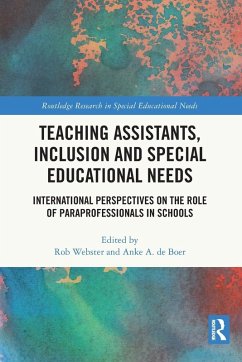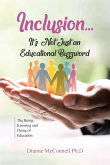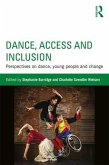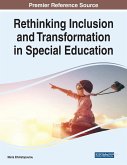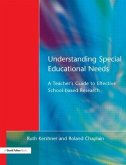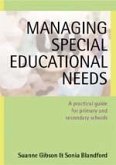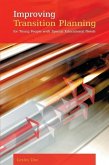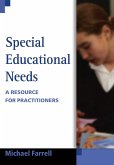Teaching Assistants, Inclusion and Special Educational Needs
International Perspectives on the Role of Paraprofessionals in Schools
Herausgeber: Webster, Rob; de Boer, Anke A.
Teaching Assistants, Inclusion and Special Educational Needs
International Perspectives on the Role of Paraprofessionals in Schools
Herausgeber: Webster, Rob; de Boer, Anke A.
- Broschiertes Buch
- Merkliste
- Auf die Merkliste
- Bewerten Bewerten
- Teilen
- Produkt teilen
- Produkterinnerung
- Produkterinnerung
This book offers the first collection of international academic writing on the topic of Teaching Assistants. It serves as an indicative summary of current research and thinking in this field and as a point of departure for future research and development.
Andere Kunden interessierten sich auch für
![Inclusion...It's Not Just an Educational Buzzword Inclusion...It's Not Just an Educational Buzzword]() Dianne McConnell Ph. DInclusion...It's Not Just an Educational Buzzword20,99 €
Dianne McConnell Ph. DInclusion...It's Not Just an Educational Buzzword20,99 €![Dance, Access and Inclusion Dance, Access and Inclusion]() Dance, Access and Inclusion65,99 €
Dance, Access and Inclusion65,99 €![Rethinking Inclusion and Transformation in Special Education Rethinking Inclusion and Transformation in Special Education]() Rethinking Inclusion and Transformation in Special Education153,99 €
Rethinking Inclusion and Transformation in Special Education153,99 €![Understanding Special Educational Needs Understanding Special Educational Needs]() Ruth KershnerUnderstanding Special Educational Needs50,99 €
Ruth KershnerUnderstanding Special Educational Needs50,99 €![Managing Special Educational Needs Managing Special Educational Needs]() Suanne GibsonManaging Special Educational Needs52,99 €
Suanne GibsonManaging Special Educational Needs52,99 €![Improving Transition Planning for Young People with Special Educational Needs Improving Transition Planning for Young People with Special Educational Needs]() Lesley DeeImproving Transition Planning for Young People with Special Educational Needs32,99 €
Lesley DeeImproving Transition Planning for Young People with Special Educational Needs32,99 €![Special Educational Needs Special Educational Needs]() Michael FarrellSpecial Educational Needs58,99 €
Michael FarrellSpecial Educational Needs58,99 €-
-
-
This book offers the first collection of international academic writing on the topic of Teaching Assistants. It serves as an indicative summary of current research and thinking in this field and as a point of departure for future research and development.
Produktdetails
- Produktdetails
- Verlag: Routledge
- Seitenzahl: 228
- Erscheinungstermin: 27. Mai 2024
- Englisch
- Abmessung: 234mm x 156mm x 12mm
- Gewicht: 354g
- ISBN-13: 9781032208626
- ISBN-10: 1032208627
- Artikelnr.: 70358943
- Herstellerkennzeichnung
- Libri GmbH
- Europaallee 1
- 36244 Bad Hersfeld
- gpsr@libri.de
- Verlag: Routledge
- Seitenzahl: 228
- Erscheinungstermin: 27. Mai 2024
- Englisch
- Abmessung: 234mm x 156mm x 12mm
- Gewicht: 354g
- ISBN-13: 9781032208626
- ISBN-10: 1032208627
- Artikelnr.: 70358943
- Herstellerkennzeichnung
- Libri GmbH
- Europaallee 1
- 36244 Bad Hersfeld
- gpsr@libri.de
Rob Webster is a reader in Education and Director of the Education Research, Innovation and Consultancy unit at the University of Portsmouth, UK. Anke A. de Boer is an associate professor at the Inclusive and Special Educational Needs unit, University of Groningen, the Netherlands.
Part I: Teaching assistants and schools. 1. Paraprofessional support in
Irish schools: From special needs assistants to inclusion support
assistants. 2. In-between special needs teachers and students:
Paraprofessionals' work in self-contained classrooms for students with
intellectual disabilities in Sweden. 3. The ambiguous role of
paraprofessionals in inclusive education in Germany. Part II: Teaching
assistants and pupils. 4. Inclusion moments for students with profound
intellectual and multiple disabilities in mainstream schools: The teacher
assistant's role in supporting peer interactions. 5. Give them wings to
fly: Critiquing the special needs assistants scheme through the lens of
pupil independence. 6. The perspectives and experiences of children with
special educational needs in mainstream primary schools regarding their
individual teaching assistant support. Part III: Teaching assistants and
teachers 7. Teaching assistants and teachers providing instructional
support for pupils with SEN: Results from a video study in Swiss
classrooms. 8. The role of teaching assistants in managing behaviour in
inclusive Catalan schools. 9. Secondary teachers' perspectives on their
work with teacher assistants. Part IV: The past, present and future of
research on teaching assistants. 10. Maslow's Hammer: Teacher assistant
research and inclusive practices at a crossroads. 11. Conclusion:
Researching teaching assistants: What have we learned and where do we go
next?
Irish schools: From special needs assistants to inclusion support
assistants. 2. In-between special needs teachers and students:
Paraprofessionals' work in self-contained classrooms for students with
intellectual disabilities in Sweden. 3. The ambiguous role of
paraprofessionals in inclusive education in Germany. Part II: Teaching
assistants and pupils. 4. Inclusion moments for students with profound
intellectual and multiple disabilities in mainstream schools: The teacher
assistant's role in supporting peer interactions. 5. Give them wings to
fly: Critiquing the special needs assistants scheme through the lens of
pupil independence. 6. The perspectives and experiences of children with
special educational needs in mainstream primary schools regarding their
individual teaching assistant support. Part III: Teaching assistants and
teachers 7. Teaching assistants and teachers providing instructional
support for pupils with SEN: Results from a video study in Swiss
classrooms. 8. The role of teaching assistants in managing behaviour in
inclusive Catalan schools. 9. Secondary teachers' perspectives on their
work with teacher assistants. Part IV: The past, present and future of
research on teaching assistants. 10. Maslow's Hammer: Teacher assistant
research and inclusive practices at a crossroads. 11. Conclusion:
Researching teaching assistants: What have we learned and where do we go
next?
Part I: Teaching assistants and schools. 1. Paraprofessional support in
Irish schools: From special needs assistants to inclusion support
assistants. 2. In-between special needs teachers and students:
Paraprofessionals' work in self-contained classrooms for students with
intellectual disabilities in Sweden. 3. The ambiguous role of
paraprofessionals in inclusive education in Germany. Part II: Teaching
assistants and pupils. 4. Inclusion moments for students with profound
intellectual and multiple disabilities in mainstream schools: The teacher
assistant's role in supporting peer interactions. 5. Give them wings to
fly: Critiquing the special needs assistants scheme through the lens of
pupil independence. 6. The perspectives and experiences of children with
special educational needs in mainstream primary schools regarding their
individual teaching assistant support. Part III: Teaching assistants and
teachers 7. Teaching assistants and teachers providing instructional
support for pupils with SEN: Results from a video study in Swiss
classrooms. 8. The role of teaching assistants in managing behaviour in
inclusive Catalan schools. 9. Secondary teachers' perspectives on their
work with teacher assistants. Part IV: The past, present and future of
research on teaching assistants. 10. Maslow's Hammer: Teacher assistant
research and inclusive practices at a crossroads. 11. Conclusion:
Researching teaching assistants: What have we learned and where do we go
next?
Irish schools: From special needs assistants to inclusion support
assistants. 2. In-between special needs teachers and students:
Paraprofessionals' work in self-contained classrooms for students with
intellectual disabilities in Sweden. 3. The ambiguous role of
paraprofessionals in inclusive education in Germany. Part II: Teaching
assistants and pupils. 4. Inclusion moments for students with profound
intellectual and multiple disabilities in mainstream schools: The teacher
assistant's role in supporting peer interactions. 5. Give them wings to
fly: Critiquing the special needs assistants scheme through the lens of
pupil independence. 6. The perspectives and experiences of children with
special educational needs in mainstream primary schools regarding their
individual teaching assistant support. Part III: Teaching assistants and
teachers 7. Teaching assistants and teachers providing instructional
support for pupils with SEN: Results from a video study in Swiss
classrooms. 8. The role of teaching assistants in managing behaviour in
inclusive Catalan schools. 9. Secondary teachers' perspectives on their
work with teacher assistants. Part IV: The past, present and future of
research on teaching assistants. 10. Maslow's Hammer: Teacher assistant
research and inclusive practices at a crossroads. 11. Conclusion:
Researching teaching assistants: What have we learned and where do we go
next?

